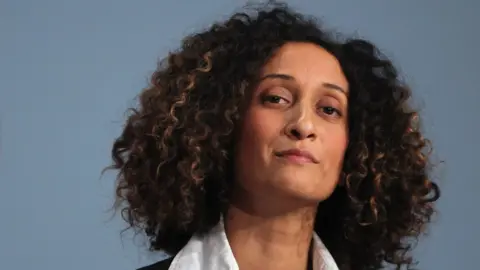Katharine Birbalsingh: Girls dislike hard maths, says education adviser
 Getty Images
Getty ImagesA government social mobility adviser has been criticised for saying girls are less likely to choose physics A-level because it involves "hard maths".
Head teacher Katharine Birbalsingh told MPs it was not a subject girls "tend to fancy", adding: "I just think they don't like it."
She said 16% of A-level physics pupils at her school were girls, but she wasn't "campaigning" for this to go up.
The Institute of Physics (IOP) said it was alarmed by the comments.
Liberal Democrat education spokeswoman Munira Wilson also called on Ms Birbalsingh to apologise for her remarks.
Ms Birbalsingh, head of the Michaela Community School in north-west London, was giving evidence to a committee of MPs about boosting diversity in science.
She told them 16% of A-level physics students at her school were girls, a much lower uptake than for chemistry, biology and maths - where the equivalent figures were often above 60 per cent.
She added that this was despite the "excellent" standard of teaching, and a good level of performance at GCSE level.
"Just from my own knowledge of these things, physics isn't something that girls tend to fancy. They don't want to do it," she added.
"I just think they don't like it. There's a lot of hard maths in there that I think that they would rather not do.
"That's not to say there isn't hard stuff to do in biology and chemistry - there is, but it's not mathematical."
Asked to explain why she thought girls would be less likely to make the choice, she responded: "Research generally, they say that's just a natural thing.
"I mean I don't know. I can't say - I mean, I'm not an expert at that sort of thing. That's what they say.
"We're certainly not out there campaigning for more girls to do physics - we wouldn't do that, and I wouldn't want to do that," she added.
"I mean, I want them to do what they want to do."
'Barriers to entry'
Responding to the comments, Rachel Youngman, deputy chief executive of the Institute of Physics, said her organisation was "very concerned at the continued use of outdated stereotypes".
"We need to listen to the experiences of young people before making assumptions which can further perpetuate the challenges they face in doing physics," she added.
"All young people need to be encouraged to learn physics and other sciences, and we need specialist teachers to provide this education."
Prof. Christina Pagel, a health academic with a background in maths, also criticised the comments, adding: "Maths and physics are beautiful subjects. The barriers to entry are not difficulty, but attitudes like this."
Ms Birbalsingh is well-known within education circles for her advocacy of discipline within classrooms and has been described as Britain's strictest head teacher.
She was appointed in October to chair the government's Social Mobility Commission, an arms-length body responsible for monitoring and promoting social mobility across the UK.